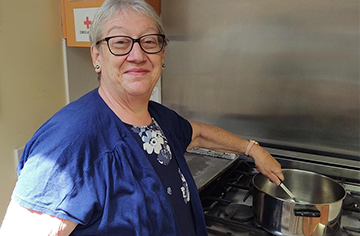Lower Sodium Meals and Snacks for Children in Rockland County
Download the story [PDF – 560 KB]
Hypertension, also known high blood pressure, can start very early in life, and children affected by hypertension are more likely to have long-term health problems as adults. One of the most common causes of hypertension in children is a high sodium diet. Many children receive most of their meals at childcare centers and schools, so it is important to ensure that they are being served healthy food.1
New York’s Rockland County Department of Health worked with a local childcare center to reduce the amount of sodium in the center’s meals and snacks. By fully understanding the center’s capabilities and barriers, the department was able to create a customized plan that ranged from food purchasing to meal preparation, with the goal of reducing sodium and providing healthier options for the children.
Public Health Challenge
Although hypertension and its complications are commonly associated with adults, children can also be affected. One way to lower the risk of hypertension in children is to provide lower sodium meals and snacks in child care centers and schools, where many children consume most of their meals.1 The U.S. Department of Agriculture’s Child and Adult Care Food Program has nutrition guidelines that eligible agencies must adhere to in order to be reimbursed for meals served at their facilities. But the current guidelines do not provide any limits on sodium levels. Because high sodium foods are often cheap and available in bulk, child care centers often rely on them to feed many children at once.
Approach

Donna Perreca prepares food in the kitchen at Jawonio Early Education Program where she works as chef.
The Rockland County Department of Health partnered with the Jawonio Early Education Program, which serves approximately 120 children aged 2 to 5 years. The children who come to Jawonio have developmental disabilities, behavioral health challenges, and chronic medical conditions.
Many of these children have special dietary needs. Before working with the Department of Health, Jawonio’s menu included many heat-and-serve meals that were high in sodium. The program chose these high sodium menu options to adapt to a limited budget, inadequate cooking equipment, a lack of cooking and storage space, and limited employee training.
To improve the menu, the Rockland County Department of Health first used the Sodium Reduction: Assessment to Action Tool to review the sodium content of the foods and ingredients served by Jawonio. The department worked with Jawonio’s food service team to find lower sodium food options from their vendors. The department also provided on-site cooking training for staff and nutrition education for teachers and parents.
Results
After reviewing the menus and food items, the Rockland County Department of Health and Jawonio created and put into action a nutrition policy that included rules for lower sodium levels in Jawonio’s meals and snacks. The Jawonio food service team found lower sodium items to add to their meals and snacks, such as a lower sodium cracker that had 52% less sodium per serving compared with the original cracker. The cooking classes showed the staff easy ways to prepare food using standardized recipes and creating flavor profiles that did not require adding salt. These efforts resulted in a 25% decrease in sodium in various meals and snacks served by Jawonio.
Cooking and nutrition are my mission! I have revamped the foods served from this kitchen with help from the Sodium Reduction in Communities Program team. This kitchen went from a processed heat-and-serve facility to more meals that are made from a recipe, prepared and assembled on site.
What’s Next
The Rockland County Department of Health will continue to work with Jawonio to make the process easier—from ordering food to developing recipes to preparing meals. The Jawonio chef created and is continuing to refine food ordering reference guides with pictures, developing more standardized recipes, and testing new meals.
The department and Jawonio are also creating recipes that fit the dietary and physical needs of the children that Jawonio serves. For example, for children who have difficulty swallowing, certain foods and recipes need to be changed to a specific texture and consistency.
The Rockland County Department of Health is conducting similar interventions at other local child care centers. Taking action at each step of the process and properly training staff ensures that meals and snacks can be modified to reduce sodium. These actions can provide long-lasting benefits for children and improve health outcomes across their lifespans.
Find Out More
Find out more by contacting the Rockland County Department of Health.
Read more about the Jawonio Early Education Program.
Use the SRCP Implementation Guide to apply sodium reduction strategies derived from the SRCP into your communities.
References
- CDC. High Blood Pressure in Kids and Teens. Accessed August 9, 2021.
